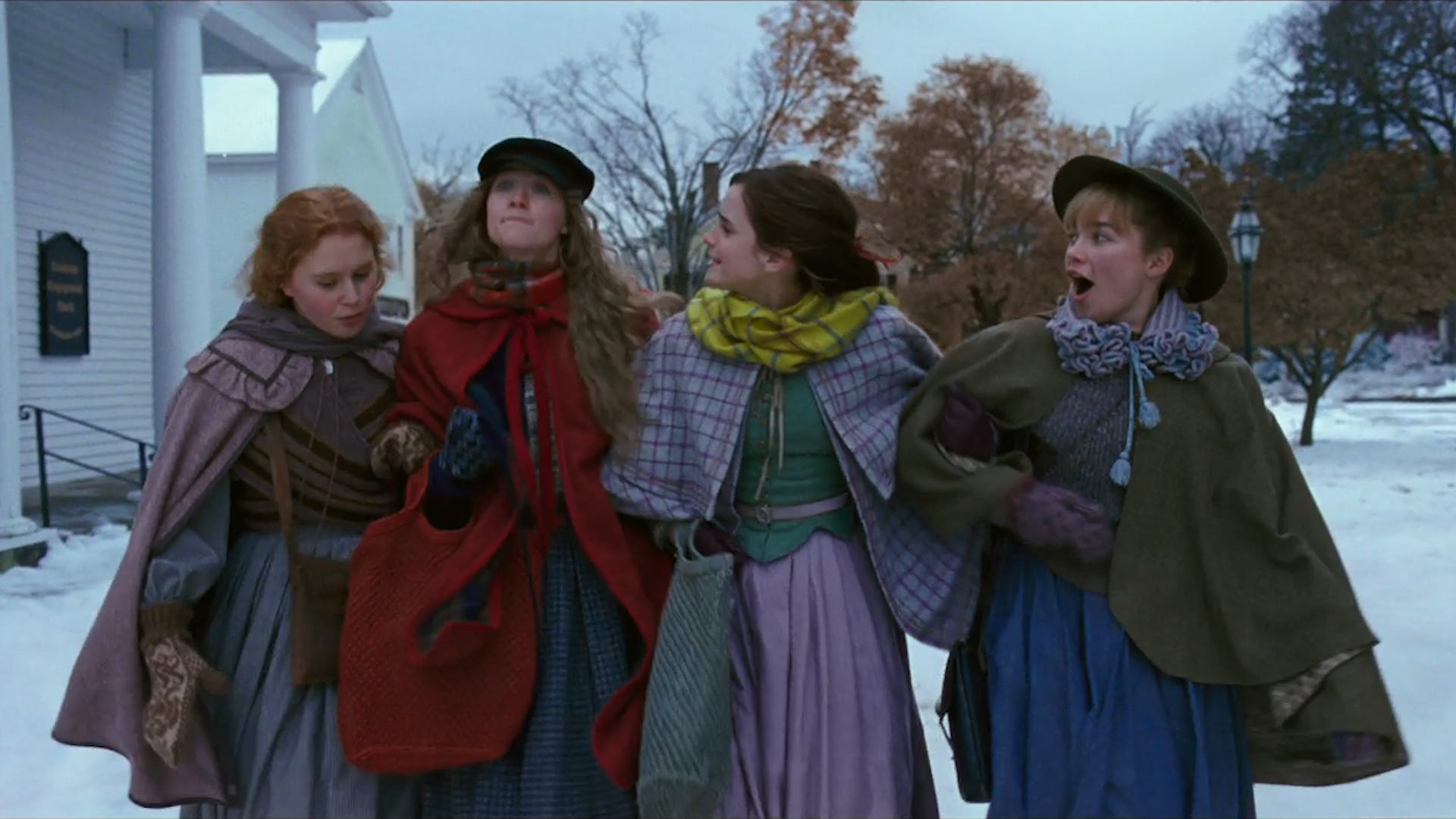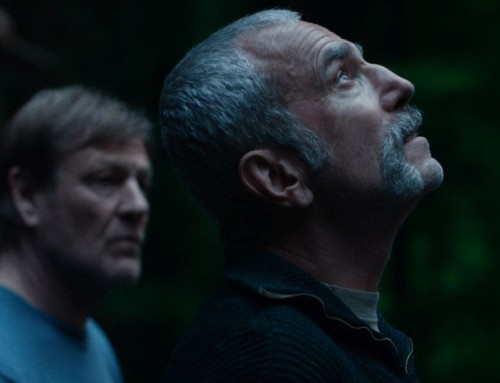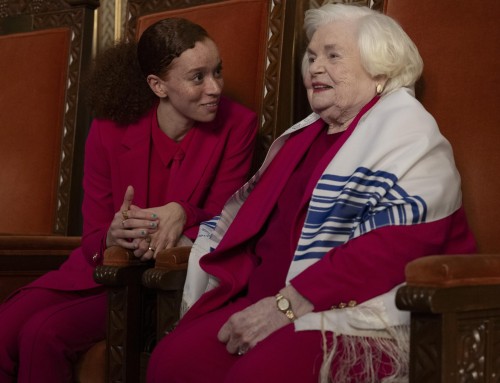![]()
Greta Gerwig’s (“Lady Bird”) new version of Louisa May Alcott’s beloved novel “Little Women” is an engaging and tender success. The latest adaptation is vividly and delicately produced, and it’s very faithful and equally modern in its accession of the novel. Gerwig gives the classic the kind of attention and visual style that is different from the TV versions and the blissful movie versions from 1933, 1949 and 1994. The new variation has splendid aesthetics, sweeping emotions, and a first-rate ensemble cast, led by the dynamic Saoirse Ronan, who at 25, continues to prove she is one of the greatest acting talents of our time.
Alcott wrote a very personal novel, and like all deeply personal tales, it’s based on social realism and other emotional truths about female empowerment, cultural norms, and inherit conformity that have remained in society for many generations, and the classic story is always worth revisiting. Over the decades, Alcott’s portrayal of Josephine “Jo” March and her sisters has been an inspiration of many other films. Indeed, “Little Women” is such a renowned and celebrated work that it comes to no bewilderment that the story remains relevant today.
With this big-screen adaptation, Gerwig and her colleagues’ main intent it making a fresh and inventive new perspective that consists of fresh social commentary, a clever flashback structure, and a meta spirit that still holds the original stories charm, wit, and emotional abundance, focusing on Jo’s independence and yearning for liberty and creativity. Gerwig never allows the material to get schmaltzy, yet her retelling shimmers with great empathy, deep characterizations and sharp whimsy along with many other conflicting tones that reside within a family.
By utilizing a clunky flashback structure that serves more of reflections to the story rather than a gimmicky device, the reflections examine Josephine “Jo” March (Ronan) reminiscing the events that led to her encounter with Theodore “Laurie” Laurence (Timothee Chalamet), his wealthy grandfather Mr. Laurence (Chris Cooper), and his instructor, John Brooke (James Norton)– an encounter that would change the circumstances and lives of Jo and her sisters.
The saga opens up with Jo March living in a boarding house in New York City during the aftermath of the Civil War. She is trying to support her struggling family back in Concord, Massachusetts by selling written stories to publisher Mr. Dashwood (Tracy Letts). With social and cultural norms, publishing stories by women is very uncommon. Jo’s independence becomes an economic burden due to her refusal of marriage while her older sister Meg (Emma Watson) and younger sisters Amy (Pugh) and Beth (Eliza Scanlen) attempt to discover their own talents and passions.
The film’s flashbacks take place in Concord during the Civil War, Jo writes her own journal entries, Meg aspires to be a stage actress, Amy yearns to be a painter, and Beth holds great talents with the piano. Their mother Marmee (Laura Dern) takes care of the family with the help of their housekeeper Hannah (Jayne Houdyshell), but sadly Marmee’s resources stretch thin after helping her community out. Jo also holds a bittersweet relationship to her Aunt March (Meryl Streep), as she routinely visits and reads to her as Aunt March continues to lecture Jo on the importance of finding love and getting married for status and economic reasons. Aunt March also keeps promising Jo that she will take Jo to her next trip in Europe–which becomes a broken promise.
During a night out dancing, Meg twists her ankle while dancing with Laurie. He ends up taking her back to the March household, where he encounters Jo, and they are instantly drawn to each other. Meanwhile, Amy builds a crush with Laurie that ends up generating tension and jealousy between her and Jo. This also leads the Marches to get acquainted with the Laurence family which leads to both families bonding together during the course of time.
Throughout the film, Gerwig cuts between the two times lines that can become a challenging burden for new viewers of the story that aren’t too acquainted with the source material. The structure also sometimes reveals too much of what will happen in the future. Yet, during the past times of the film it works well with the girls’ character arcs and depth. One of the films richest scenes involves Jo being criticized by a literature professor and critic Friedrich Bhaer (Louis Garrel), who surely acknowledges Jo’s great talents, yet believes it is lacking something personal. While the flashbacks may come off jarring and not always successful, it is commanding in just how ambitious and unique Gerwig has accomplished with her adaptation. The craftsmanship of the film is also visually arresting, as Gerwig and cinematographer Yorick Le Saux imbues stark atmosphere merged with darkness and light along with stunning landscape cinematography that echoes the aesthetics of Sofia Coppola’s “The Beguiled” and Terrence Davies “A Quiet Passion”.
What indeed works here are the performances and superb ensemble casting. Ronan and Chalamet are absolutely wonderful together in this just as they were in Gerwig’s 2017 directorial debut “Lady Bird”. Ronan brings great charm and warmth throughout, delivering one of her most compelling performances to date. Chalamet also delivers a natural and witty performance that starts off charming and shortly becomes complex and wounded. But it’s Florence Pugh that is the true stand-out here as the bratty Amy, Pugh truly elevates her character of Amy under Gerwig’s direction, that captures the characters’ self-absorbed sensibilities and selfishness that ends up being transcended with far more character depth and nuance than previous adaptations and interpretations.
All around Gerwig delivers an eloquent and layered film, full of absolute grace and grandeur. It merges personal truths relating to her own career as a film director that also echoes Alcott’s own story that remains a clear personal story to Alcott. “Little Women” becomes a deeply complex film about sisterhood, independence, individualism and unrequited love. It is a film about young women attempting to sort themselves out in a society that embrace women getting married and starting a family rather than pursuing their true passions and dreams. Gerwig’s film is an absolute delightful film filled with a lot of idealism about staying true to your passion and talents.







/cdn.vox-cdn.com/uploads/chorus_asset/file/19545334/littlewomen3.jpg)





Movie was kind of confusing, but I enjoyed its message of female independence and empowerment.
There is only one Little Women movie and that is the from the 90s starring Winona Ryder.
That’s great Robert! You’ve convinced me to see the movie— even though I thought I had seen enough versions of Little Women! I’ll go tomorrow.
Little Women is delightful, joyous, refreshing, uplifting, I dont know. It’s everything wonderful I can say about it. I enthusiastically recommend seeing it!
That’s great Robert! You’ve convinced me to see the movie— even though I thought I had seen enough versions of Little Women! I’ll go tomorrow.
Write more, thats all I have to say. Literally, it seems as though you relied on the
video to make your point. You definitely know what youre talking
about, why waste your intelligence on just posting videos to your blog when you could be giving us something enlightening to read?
I rattling pleased to find this internet site on bing, just what I was searching for also saved to my bookmarks.
226530 510428Aw, this was an exceptionally good post. In concept I would like to place in writing such as this moreover – spending time and actual effort to create a excellent article but so what can I say I procrastinate alot by way of no indicates find a way to go completed. 812783
645356 934459Outstanding post, I conceive internet site owners should learn a good deal from this weblog its real user pleasant. 40257
433628 983027Some genuinely good stuff on this internet internet site , I it. 447470
685101 968069Youre so cool! I dont suppose Ive learn something like this before. So excellent to search out any person with some distinctive thoughts on this topic. realy thanks for starting this up. this site is one thing thats wanted on the net, somebody with a bit originality. valuable job for bringing one thing new towards the internet! 1807
296391 760896Discover how to deal together with your domain get in touch with details and registration. Understand domain namelocking and Exclusive domain name Registration. 298283
976679 538537I wish I had a dime for every bad post Ive read lately. I also wish other writers had your talent and style. Thank you. 384628
949880 479276I dont typically comment but I gotta state thanks for the post on this excellent one : D. 30908
900774 84221I usually cant uncover it in me to care enough to leaves a comment for articles on the web but this was actually pretty good, thanks and keep it up, Ill check back once more 334835
587176 800700I like this web site really a lot, Its a rattling nice place to read and get information . 923045
673018 363355Oh my goodness! a fantastic post dude. Thank you Even so I is going to be experiencing problem with ur rss . Dont know why Can not subscribe to it. Will there be any person obtaining identical rss problem? Anybody who knows kindly respond. Thnkx 447959
352169 356522Enjoyed reading this, very very good stuff, thankyou . 145401
I just want to tell you that I am just very new to blogging and site-building and truly savored your web blog. More than likely I’m likely to bookmark your blog . You amazingly come with really good writings. Thank you for revealing your blog.
Hi! I just would like to give a huge thumbs up for the great info you have here on this post. I will be coming back to your blog for more soon.
Best view in the town !
WOW just what I was looking for. Came here by searching for sexting
I have been surfing online greater than 3 hours nowadays, yet I by no
means found any fascinating article like yours.
It’s beautiful price sufficient for me. In my opinion, if all
web owners and bloggers made good content as you did, the web might be much
more helpful than ever before.
Good day! I know this is kinda off topic however I’d
figured I’d ask. Would you be interested in trading links or maybe guest authoring a blog post
or vice-versa? My blog addresses a lot of the same subjects as yours and I believe we could greatly
benefit from each other. If you happen to be interested
feel free to send me an e-mail. I look forward to hearing from you!
Great blog by the way!
This text is worth everyone’s attention. When can I find out more?
There is definately a lot to find out about this topic. I like all of the points you’ve made.
145994 792189Hi there, just became aware of your weblog by means of Google, and found that it is really informative. Im gonna watch out for brussels. Ill be grateful should you continue this in future. Many folks will likely be benefited from your writing. Cheers! 861660
589224 11713Deference to op , some superb selective data . 635257
And manganese causes black staining and is usually discovered with iron.
This site was… how do you say it? Relevant!!
Finally I’ve found something that helped me. Many thanks!
I for all time emailed this webpage post page to all my contacts,
as if like to read it then my friends will too.
452393 409860As I site possessor I believe the content material material here is genuinely excellent , regards for your efforts. 644748
125625 877791Id forever want to be update on new posts on this internet site , bookmarked ! . 944101
Hey just wanted to give you a quick heads up. The text in your post seem to be running off the screen in Opera. I’m not sure if this is a formatting issue or something to do with internet browser compatibility but I figured I’d post to let you know. The design and style look great though! Hope you get the problem solved soon. Cheers|
After looking at a number of the blog articles on your site, I honestly like your way of writing a blog. I book-marked it to my bookmark website list and will be checking back soon. Please check out my web site too and let me know what you think.|
Howdy! I know this is kinda off topic but I was wondering which blog platform are you using for this site? I’m getting fed up of WordPress because I’ve had issues with hackers and I’m looking at alternatives for another platform. I would be great if you could point me in the direction of a good platform.|
This paragraph will help the internet viewers for building up new weblog or even a blog from start to end.|
I read this piece of writing completely on the topic of the difference of most recent and preceding technologies, it’s awesome article.|
excellent points altogether, you simply received a new reader. What could you recommend in regards to your publish that you just made a few days in the past? Any sure?|
Hmm is anyone else experiencing problems with the pictures on this blog loading? I’m trying to determine if its a problem on my end or if it’s the blog. Any feed-back would be greatly appreciated.|
560387 299434I discovered your weblog internet site on google and examine several of your early posts. Continue to sustain up the superb operate. I simply extra up your RSS feed to my MSN News Reader. In search of forward to reading far more from you later on! 912692
177550 368787Hi, in the event you want to get higher rankings, you ought to look at the plugin I left in my link, it will help. 641433
463486 258658I discovered your weblog internet site on google and check just a few of your early posts. Proceed to sustain up the exceptional operate. I just extra up your RSS feed to my MSN Details Reader. Seeking forward to reading far more from you in a although! 495210
My spouse and I stumbled over here different web page and thought I might as well check things out.
I like what I see so i am just following you. Look forward to looking into your web page for a second time.
Excellent website you have here but I was wanting to know if you knew of any community forums that cover the same topics discussed here? I’d really like to be a part of community where I can get advice from other knowledgeable people that share the same interest. If you have any recommendations, please let me know. Many thanks!|
You’re so cool! I do not think I’ve truly read something like this before. So great to discover somebody with unique thoughts on this issue. Really.. thank you for starting this up. This website is one thing that’s needed on the web, someone with some originality!|
Wow, marvelous weblog layout! How lengthy have you been running a blog for? you made blogging look easy. The entire look of your website is magnificent, as smartly as the content material!
183172 18320You can certainly see your enthusiasm within the work you write. The world hopes for more passionate writers like you who arent afraid to say how they believe. Always go soon after your heart. 276580
781213 554413Hey! Fine post! Please maintain us posted when I can see a follow up! 712990
Hi, this weekend is good for me, since this point in time
i am reading this great informative article here at my house.
151047 439427Someone essentially assist to make severely posts I may possibly state. That could be the very very first time I frequented your website page and so far? I surprised with the analysis you produced to create this specific submit incredible. Magnificent task! 857016
604554 483288I dont agree with this particular post. Nevertheless, I did researched in Google and Ive identified out that you are correct and I had been thinking inside the incorrect way. Continue producing quality material comparable to this. 628757
233257 571437Dead written articles , appreciate it for entropy. 905780
I think the admin of this web site is really working hard in support of his website, for the reason that here every material is quality based information.|
Greetings from Los angeles! I’m bored at work so
I decided to browse your website on my iphone during lunch break.
I enjoy the information you present here and can’t wait to take a look when I get home.
I’m amazed at how fast your blog loaded on my cell phone ..
I’m not even using WIFI, just 3G .. Anyways, wonderful blog!
257498 856662Thank you for the very good writeup. It in fact was a amusement account it. Appear advanced to far added agreeable from you! However, how could we communicate? 318166
i appreciate the fact of the information that was given
Hi defactofilmreviews.com admin, You always provide clear explanations and definitions.
Dear defactofilmreviews.com owner, Your posts are always well written.
Dear defactofilmreviews.com administrator, Great job!
Hi defactofilmreviews.com administrator, Your posts are always well-referenced and credible.
Dear defactofilmreviews.com administrator, Your posts are always on topic and relevant.
Hello defactofilmreviews.com owner, Thanks for the well-researched and well-written post!
Dear defactofilmreviews.com owner, You always provide in-depth analysis and understanding.
Dear defactofilmreviews.com webmaster, Thanks for the well written post!
To the defactofilmreviews.com owner, You always provide in-depth analysis and understanding.
To the defactofilmreviews.com webmaster, Your posts are always well-supported by facts and figures.
Dear defactofilmreviews.com owner, Keep sharing your knowledge!
To the defactofilmreviews.com webmaster, Your posts are always well written.
Hi defactofilmreviews.com owner, Your posts are always informative and well-explained.
Dear defactofilmreviews.com admin, Your posts are always well-supported by facts and figures.
Dear defactofilmreviews.com webmaster, Your posts are always well-supported by research and data.
Dear defactofilmreviews.com webmaster, Your posts are always interesting.
There are reputable B2B marketplaces in the France market, including Exporthub, so without further ado, visit the France B2B Marketplace and buy or sell your preferred things there.
In the Vietnam market, there are credible B2B marketplaces is one as the Exporthub Vietnam B2B marketplaces so without discussion go on the site and buy or sell your favorite items from the site.
Dear defactofilmreviews.com administrator, Your posts are always well-cited and reliable.
Dear defactofilmreviews.com owner, You always provide useful tips and best practices.
Dear defactofilmreviews.com webmaster, You always provide clear explanations and step-by-step instructions.
Hello defactofilmreviews.com owner, Your posts are always informative and well-explained.